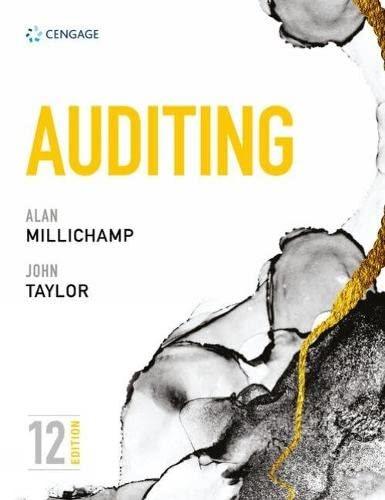Camomile Ltd operates six restaurant and bar venues which are open seven days a week. The company's
Question:
Camomile Ltd operates six restaurant and bar venues which are open seven days a week. The company's year end is 31 December 2021.
You are the audit supervisor reviewing the internal controls documentation in relation to the cash receipts and payments system in preparation for the interim audit, which will involve visiting a number of the venues as well as the head office. The company has a small internal audit (IA) department based at head office.
The purchasing department based at the company's head office is responsible for ordering food and beverages for all six venues. In addition, each venue has a petty cash float of £400, held in the safe, which is used for the purchase of sundry items.
When making purchases of sundries, employees are required to obtain the funds from the restaurant manager, purchase the sundries and return any excess money and the receipt to the manager. At any time the petty cash sum held and receipts should equal the float of £400, but it has been noted by the company's IA department that on some occasions this has not been the case.
Each venue has five cash tills to take payments from customers. Three are located in the bar area and two in the restaurant area. Customers can pay using either cash or a credit card.
To speed up the payment process, each venue has a specific log on code which can be used to access all five tills and is changed every two weeks. At each venue, at the end of the day, the tills are closed down by the restaurant manager who counts the total cash in all five tills and these totals are reconciled with the aggregated daily readings of sales taken from each till. Any discrepancies are noted on the daily sales sheet. The daily sales sheet records the sales per the tills, the cash counted and the total credit card sales from the till records, as well as any discrepancies.
These sheets are scanned and emailed to the cashier at head office at the end of each week.
Approximately 30 per cent of Camomile Ltd's customers pay in cash which is stored in the safe at each venue on a daily basis after the sales reconciliation has been undertaken. Each safe is accessed via a key which the restaurant manager has responsibility for. Each key is stored in a drawer of the manager's desk when not being used.
Cash is transferred to the bank via daily collection by a security company. The security company provides a receipt for the sums collected and these receipts are immediately forwarded to head office.
The credit card company remits the amounts due directly into Camomile Ltd's bank account within two days of the transaction.
At head office, on receipt of the daily sales sheets and security company receipts, the cashier agrees the cash transferred by the security company has been banked for all venues. They agree the cash per the daily sales sheets to bank deposit slips and to the bank statements. The cashier updates the Cash Book with the cash banked and details of the credit card vouchers from the daily sales sheets.
On a monthly basis, the credit card company sends a statement of all credit card receipts from the six venues which is filed by the cashier. Every two months, the cashier reconciles the bank statements to the Cash Book. The reconciliations are reviewed by the financial controller who evidences review by signature, and these are filed in the accounts department. All purchases of food and beverages for the venues are paid by bank transfer. At the relevant payment dates, the finance director is given the total amount of the payments list, which they authorize.
Required:
Identify and explain eight deficiencies in Camomile Ltd's cash receipts and payments system and provide a recommendation to address each of these deficiencies. Prepare your answer using two columns headed Control deficiencies and Control recommendation, respectively.
Step by Step Answer:






